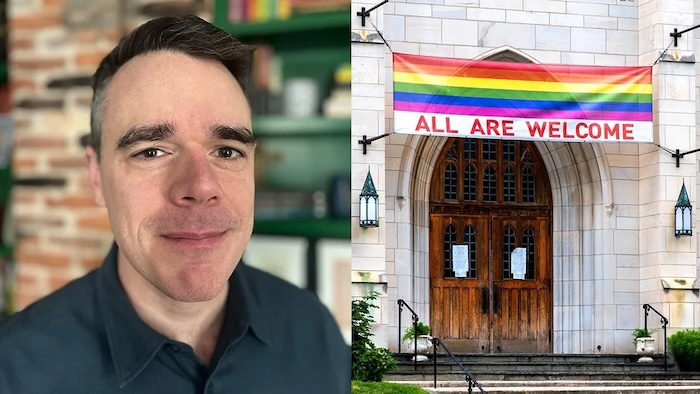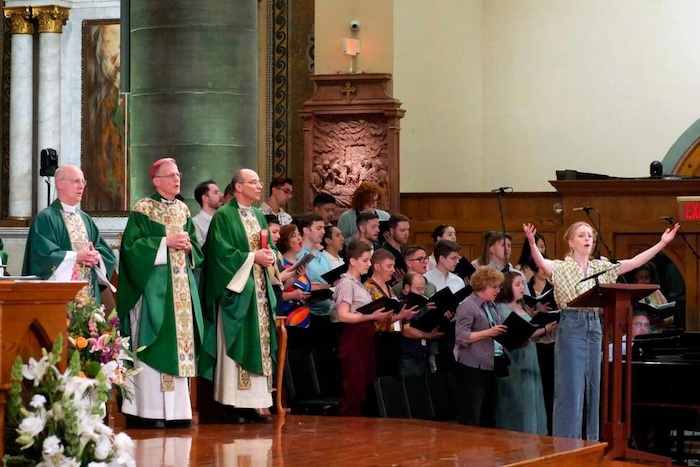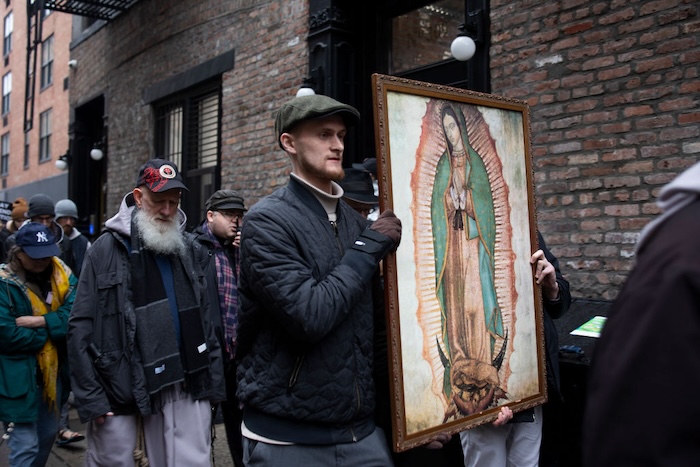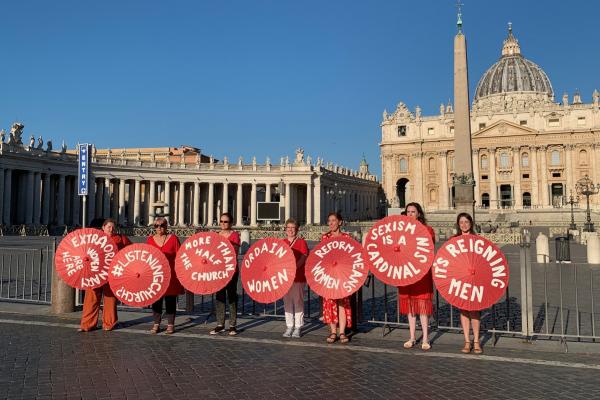
By Trudy Ring
Many LGBTQ+ Catholics have a fraught relationship with the church, given its teachings against same-sex relationships and gender transition. Some leave for another faith or none at all, but some stay and try to make Catholicism work for them. As the new executive director of the LGBTQ+ Catholic ministry Outreach, Michael O’Loughlin’s goal is to help those who stay find welcoming spaces — and to create more of those.
“There can be room” for out, self-accepting LGBTQ+ people in the church, says O’Loughlin, a gay man who has worked as a journalist for The Advocate, The New York Times, The Boston Globe, and numerous other publications.
He was most recently national correspondent for America, a magazine affiliated with the Jesuits, a Catholic religious order noted for scholarship and a commitment to social justice, and Outreach is an official Jesuit ministry. Founded two years ago by Rev. James Martin, a priest noted for his LGBTQ+ allyship, Outreach is a resource for LGBTQ+ Catholics, publishes a news and analysis website, and holds an annual conference. O’Loughlin is its first executive director, and Martin will continue to provide leadership in his role as founder.
O’Loughlin has spent the past few years promoting his book Hidden Mercy: AIDS, Catholics, and the Untold Stories of Compassion in the Face of Fear, about Catholics who stepped up to serve those affected by the epidemic even as the church sometimes turned away. In talking about the book, he encountered many LGBTQ+ people who longed for a welcoming space within the Catholic Church. He was attracted to Outreach because it’s creating those spaces, he says.
Trending stories
He was brought up Catholic and struggled at times to make sense of being both Catholic and gay. “Early on, I was confronted with the idea that I had to choose to live as a gay person or choose to practice my faith,” he says. In the end, though, he decided “you don’t have to choose one or the other.”
He realizes that not everyone can do what he did. “It’s fairly obvious that the church has been damaging to LGBTQ people throughout history,” he says, and notes that it’s understandable that some would leave. But with Outreach, he seeks to highlight the stories of those who’ve stayed in the faith and are not only feeling affirmed there but also providing important services to the church — teaching, serving as music directors, working in food pantries and homeless shelters, and more. They’re “living the gospel,” he says.
Most Recent
The ministry, he says, won’t shy away from the challenges facing LGBTQ+ Catholics; he acknowledges that some LGBTQ+ people have been fired by church-affiliated entities simply because of their identity, but he notes that there has been pushback against such discrimination, especially by the Jesuits. However, many LGBTQ+ Catholics are finding those welcoming spaces he talks about, he says, and Outreach can help parishes understand how to be more welcoming.
He has worked alongside Martin, editor at large for America, for several years. “What I admire about Jim’s work is he’s able to advocate for greater inclusivity while working within the framework of the church,” O’Loughlin says. “He’s been very successful in bringing people together.” Martin is the author of several books, including Building a Bridge: How the Catholic Church and the LGBT Community Can Enter Into a Relationship of Respect, Compassion, and Sensitivity.
“Everyone at Outreach is overjoyed,” Martin said in a press release announcing O’Loughlin’s appointment. “With his years of journalistic experience, his theological background, two books to his credit, and his deep knowledge of the LGBTQ community, I can think of absolutely no one better suited for this job. This is the perfect job for Mike, and Mike is the perfect person for this job.”
Outreach is not a competitor to other LGBTQ+ Catholic groups, such as DignityUSA and New Ways Ministry, both of which have a mission of advocating for LGBTQ+ equality within the church, O’Loughlin says. “There is room for all these different groups to work together,” he says.
Asked about potential changes to church doctrine, he says he can’t predict what the future will hold. Ten years ago, he wouldn’t have expected that any pope would approve blessings for same-sex couples, although Pope Francis has since said the blessings are not for the relationship but for the individuals in it. Still, he says, “I’m encouraged that Pope Francis continues to make space with these conversations.” So he’ll stay hopeful about what the next 10 years might bring.
Complete Article ↪HERE↩!








